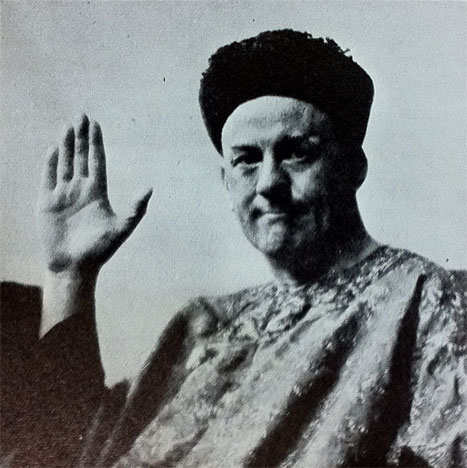Editor’s Note.—Kwaw Li Ya is the most famous of the small group of Chinese poets known as the Yung Chang school. Of the Shen Si—or landed gentry class—he has devoted his great wealth to traveling and to studying the literatures of other nations. A fanatical adherent of the fallen Emperor, his latter years have been spent in exile from his native valleys. He is now passing a few months in New York. In religion he is a strict Taoist, and is the author of the politico-mystical romance entitled “Thien Tao” or “The Way of Heaven.” He is perhaps best known because of his five volumes of aphorisms.
- The Hokku is a favourite verse form in Japan. Every year there is a Hokku Competition, which is entered even by the Mikado.
- The Hokku is a poem of seventeen syllables.
- The Hokku should not be alliteration, suggestion, allusion, or epigram, thought it is, in part, all of these. The Hokku is in a word—a MOOD.
- The Hokku is a cunningly cut jewel of words. It is like a diamond or an alexandrite, clear or coloured, but reflecting varied rays of thought as the light of the mind plays over it.
Here is a classical Hokku which is esteemed by the “old-fashioned” school of poetry in Japan as the best ever written. It is a micrososm of Autumn melancholy.
On a withered twig
Lo, the crow is sitting there—
Oh, this Autumn eve!
The author of the following Hokku, my friend Yone Noguchi, was walking in Hyde Park. He was musing on the long hair of a woman in one of Rossetti’s pictures. The dusk surprised him; he compared the two impressions, and expressed their sympathy.
My love’s lengthened hair
Swings o’er me from Heaven’s gate:
Lo! Evening’s shadow!
Since arriving in America, I have been trying to fix upon a correct metrical form for an English type of Hokku. I have chosen this metre:
Dactyl—spondee
Spondee—dactyl—spondee
Dactyl—spondee
(A dactyl is a long syllable followed by two shorts, as “happily”; a spondee is two longs, as “groaning.”)
The use of rime vulgarizes the Hokku at once. In English there is a difficulty in finding true dactyls. Too many of the smaller words are either themselves long, or make other words “long by position.”
Here is a fine person Hokku, by an American friend of mine:
Catherine Cheney.
Plumpness brought to a fine art!
Cat, or Canary?
This is certainly a fine portrait of a beautiful woman. It suggests the query, “Can I cage you, pet, or am I only the mouse with which you are playing?”
Hokku-making is a delightful pastime. It is an endeavor to cut an intaglio or a cameo, in that hardest of all stones—language, with its baffling index of refractions.
Success may be impossible, but “firm correctness,” as we say in China, is great, even in defeat—a death-spasm of the soul. Hokku-making is the calculated ecstasy of hari-kiri.
Write Hokkus, my friends! It is better than opium, or love, or death! Here is a fine example of a double Hokku, having, for its only theme the Hokku itself:
Catch me, caress me,
Crush me! Gather a dewdrop—
Star to a system!
God in an atom!
Comets revel around him—
That is a hokku!
Vanity Fair has permitted me to offer a first prize of ten dollars, for the best single Hokku on the following interesting theme:
A young lover, distracted by jealousy, finds himself looking out over New York harbor. The sun is setting. The gigantic buildings and towers of Manhatten are silhouetted against the summer sky.
I have agreed to judge the Hokkus in this contest and will announce the prize winders in the issue for October.
All Hokkus, which must be single, in form, should be addressed to the Editor of Vanity Fair, New York City.
They should be in his hands not later than August 20th.

